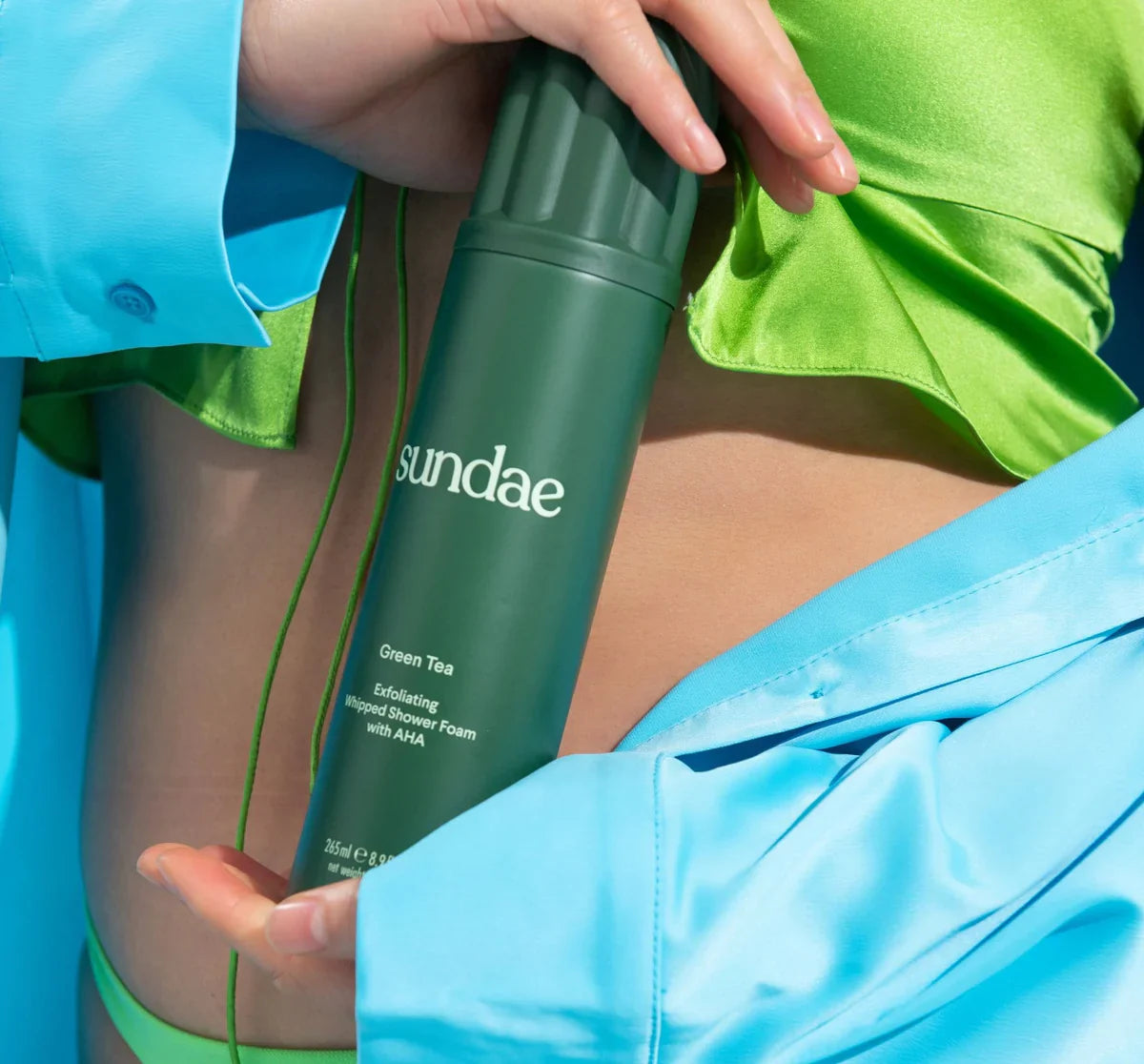Do I Really Need To Exfoliate My Skin? Here's What Happens When You Don't

Dry, flaky skin getting you down? Don't worry; you're not alone. If, like us, you're tired of cracks, flakes, congestion or unevenness on your dermis, it might be time to consider a little something called exfoliation.
Exfoliation is a key part of any sensible skincare routine: removing the top layer of dead skin cells, revealing fresh, healthy skin underneath. With regular exfoliation, you’re only a soak, scrub and slather away from a smooth, glowing complexion. Like a dumpling or a dolphin. A dolphin dumpling? In this piece, we'll go over why exfoliating is so important and how to do it right. Get comfy because Sundae School is officially in session.
Benefits of Exfoliation
Universal fact: exfoliation is a no-joke game-changer for your skin. For one, it unclogs your pores, which can often get all plugged up with dead skin cells, sebaceous oil, and grime. Say goodbye to breakouts and blackheads!
Exfoliating also gives your skin texture and tone a generous boost of je ne sais quois – when you slough off the dead skin cells, you're left with brighter, smoother, more even skin. This can also mean fewer fine lines, wrinkles, and age spots – if that’s your desired vibe.
👉 You'll love: Glow-up through the power of exfoliation
Plus, like a workout on the dancefloor, exfoliation increases blood flow to your skin, giving it a healthy glow. It even stimulates collagen production so that you can enjoy youthful-looking skin, or at least remain hopeful that your local wine shop attendant might consider asking you for a peek at your ID.
And, for a bonus: exfoliation gives your other skincare products a leg up towards working way, way better. How? Well, dead skin cells can block your serums and moisturizers from getting absorbed. Clearing away that layer of gunk allows your products to work their magic. A type of magic you deserve in spades.
Types of Exfoliation
There are two ways to exfoliate: physical and chemical.
Physical exfoliation is when you use a scrub or brush to remove dead skin cells physically. You can do this with a manual scrub or an electronic brush. We’re massive fans of dry brushing before jumping into the shower for a sweet serve of lymphatic drainage, too. Whatever option floats your boat, remember to be gentle and use light, circular motions to avoid irritating your skin.
Chemical exfoliation is when you use acids to dissolve dead skin cells. And no, it’s not as horrifying as it sounds, with the use of two magical ingredients called alpha-hydroxy acids (AHAs) or beta-hydroxy acids (BHAs). AHAs like glycolic acid and lactic acid break down the bonds between dead skin cells, while BHAs like salicylic acid penetrate your pores to remove impurities.
👉🏽 Check out: Sundae's Guide To Exfoliating Different Skin Types
Both physical and chemical exfoliation can work great, but you need to choose the right one for your skin type. BHAs may be the way to go if you have oily or acne-prone skin. AHAs might be a better choice if your skin's dry or sensitive.
How Often Should You Exfoliate?
How often you exfoliate depends on your skin type. Most people should aim for 1-2 times a week. If your skins on the sensitive side, start with once a week and build up slowly.
Don't go overboard with exfoliation, though (we know you want to!) Like tequila, too much can damage your skin and leave it irritated. Signs that you're overdoing it include redness, dryness, and flakiness. If you notice any of these symptoms, ease up on the exfoliation or switch to a gentler method.
💡 Did you know: Sundae Green Tea shower foam contains AHAs that delicately exfoliate dead skin and unclog congested pores, leaving it feeling rejuvenated and refreshed!
Tips for Exfoliating
To get the most out of your exfoliating routine:
- Choose an exfoliant that's right for your skin type. If you're not sure, ask a skincare pro.
- Be gentle! Don't press too hard or scrub too vigorously.
- Skip sensitive areas like your eyes and any broken skin.
- Moisturize after exfoliating to hydrate and nourish your skin.
- Protect your skin from the sun with sunscreen, especially after exfoliating. Your skin will be extra-sensitive to those harmful rays.
Conclusion
What if you don’t exfoliate? Well, your skin naturally sheds dead skin cells on its own, but sometimes they can pile up on the surface, which can cause a handful of skin irks like dullness, dryness, and clogged pores.
When your skin is covered in dead skin cells, it can also make it harder for your skincare products to sink in and do their thing. So don't be surprised if you're not seeing the full benefits of your routine if you're not exfoliating on the reg.
Plus, if you've got oily or acne-prone skin, not exfoliating can actually make your breakouts worse. Dead skin cells can mix with the oil and bacteria on your skin, leading to clogged pores and inflammation.
So there you have it, folks. Exfoliating is a crucial step in any skincare routine. Keep your skin looking bright like Rihanna at the Superbowl by giving it a good exfoliation sesh on the reg. Don't forget!
Happy Sundae x
Some whipped shower foams to get you started 👇
Pomegranate Fizz Foaming Body Wash | Coconut Cream Foaming Body Wash | Honey Honey Foaming Body Wash
🤑 Save up to 20% when you Build Your Own Bundle
Written By: Lizzie Waley (Sundae Co-Founder & Body Care Enthusiast) | LinkedIn
Fact Checked: Charnnie Frimpong (Sundae Content Marketing Manager) | Linkedin
Our Sources
https://awomanshealth.com/skin-beauty/the-importance-of-exfoliation
https://www.womenshealthmag.com/uk/beauty/skin/a29573130/best-face-exfoliator/
https://www.healthline.com/health/beauty-skin-care/meaning-of-exfoliating
